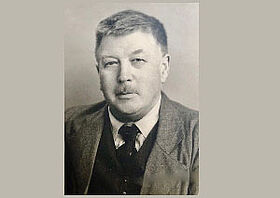
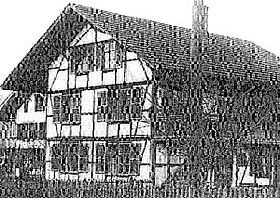
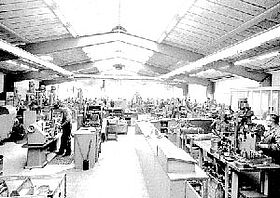
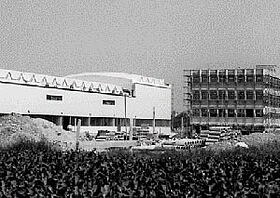
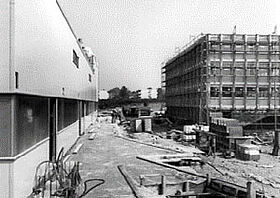
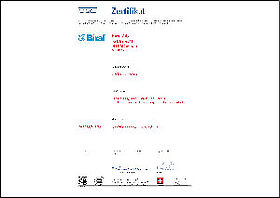
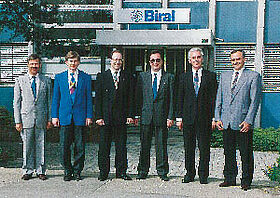
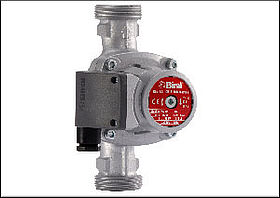
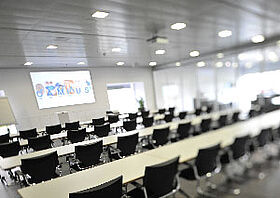
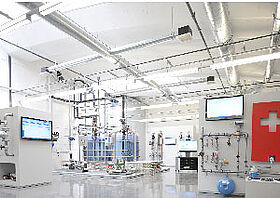
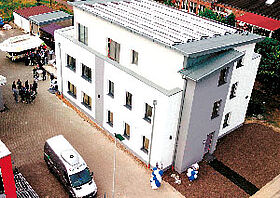
Biral: 100 years of Swiss innovation and efficiency
Biral, Switzerland’s leading pump manufacturer based in Münsingen near Bern, celebrates its centenary anniversary in August. Founded as a mechanical workshop for all kinds of repairs and as a sales outlet for agricultural machinery, the once-small business quickly came to specialise in the construction of pumping systems. Today, Biral is not only successful in Switzerland, but also on the international market.
The boss, two employees and two apprentices: That was the extent of the workforce behind Friedrich Bieri’s mechanical workshops at the time of the company’s formation 100 years ago. At the company’s premises on Dorfmattweg road in Münsingen, the services offered soon expanded from simple repairs to the design and construction of horizontal saws and oil-firing systems. In 1923, Friedrich Bieri and his employees installed cooling units from fellow Swiss manufacturer Escher Wyss and, in that same year, the first pumping units were installed. With this, the cornerstone of the subsequent core business was laid.
Yet, nearly 10 years later, Friedrich Bieri’s small enterprise also fell victim to the effects of the global economic crisis that prevailed at the time. As a result, some of the workers had to be transferred to agricultural activities instead. In spite of the war that followed, the company was able to assert itself and even expand – in 1945, the workforce numbered 10 employees. Three years after the end of the Second World War, Friedrich Bieri and his sons Franz and Werner established a limited commercial partnership. The business now employed a total of 15 people, and pump construction accounted for 90 per cent of all turnover.
On 1st January 1953, Friedrich Bieri’s sons Franz and Werner took over management of the business. The company henceforth became known as Friedrich Bieri’s Söhne (“Friedrich Bieri’s sons”) and continued to specialise in innovative pump construction. Their first great success came in 1956, with the manufacture of circulation pumps that had no conduit glands: More than 1000 units per year were produced and sold in Münsingen. In the three years that followed, sales of circulation pumps rocketed and the company grew at a rapid pace to match. In the year of its 40th anniversary, its workforce swelled to 40 people, and so a new production site had to be found. The 300 m2 premises on Dorfmattweg could no longer accommodate the growing company, particularly where plans for further expansion were concerned: In 1960, the Bieri brothers began to offer their pumps to foreign markets, expanding into the Netherlands, Germany, Belgium, the United Kingdom and Austria. A year later, a new factory building with a production area of 1500 m2 was acquired. Thanks to this, the number of employees jumped to 100 in 1961.
In 1962, the two company owners founded the RCB engine factory in the lakeside town of Beinwil am See, in the canton of Aargau. From then on, the engines for the Bieri pumps were to be produced there. As a result, the company underwent a phase of growth once again, now totalling 140 employees.
Ulrich Bieri, the first representative from the third generation of the family-run enterprise, joined the company in 1966, and it was once again renamed: The limited partnership Friedrich Bieri’s Söhne now went by the name of Bieri Pumpenbau AG. By this time, special pumps for all kinds of goods for transportation were being manufactured in the production halls of the Münsingen-based pioneers, who now numbered 170 employees in total. In order to be able to offer significantly better retirement benefits for its expanding workforce, the pension scheme was outsourced to an autonomous pension fund foundation in 1968.
In the 1970s, Bieri Pumpenbau AG continued its high-flying performance. In 1971, the growing company acquired a new premises at Südstrasse 10 in Münsingen. In 1972, the first computer systems were put into operation, and a record turnover of 35.8 million Swiss francs was achieved. The second representative from the third generation came in the form of Peter Bieri, who joined the company in 1973. He assumed responsibility for the production division. By the time flexible working hours were introduced in 1974, Bieri Pumpenbau AG employed a total of 265 workers, both men and women alike.
Not long after, however, the successful pump manufacturer, which was still based in the vicinity of Bern, had to deal with a significant setback. Due to the recession, the number of orders took a hit. Consequently, short-time working was implemented from May to July 1975, and the headcount was reduced to 245 employees. Nevertheless, by 1976, the market had recovered: Turnover rose once again and staffing levels were restored to the same numbers as prior to the recession.
1979 saw the complete handover of the company to the third generation: Ulrich, Peter and Hansruedi Bieri took over management of the business. At the same time, they founded a subsidiary in Germany, and opened a sales office in Zurich the following year. From this point on, the first personal computers were employed within the company, and soon after – in 1982 – order processing and invoicing was carried out entirely on an electronic basis.
Alongside the subsidiary that was founded in Austria in 1982, branch offices were also established in the Netherlands and the USA in 1988. The American subsidiary was founded as Biral Inc. – the first time this name, which would subsequently become the name of the company as a whole (and remains the name it trades under today), had been used in the history of the company. Surred on by this ongoing success, the Münsingen-based entrepreneurs continued their relentless course of expansion as they moved into 1989 – the 70th anniversary of the company’s founding. They acquired the German company Habil and founded a fourth subsidiary in the United Kingdom. Around the same time, they split off their water treatment division into an independent company, Bewatec, which nonetheless remained part of the group. In 1991, the company was certified in accordance with ISO-9001/EN 29001.
From 1992 onwards, Bieri Pumpenbau AG, which now employed a total of 420 people, struggled with difficulties in the sales markets. As a consequence of this, the subsidiary in Austria was sold. Having done so following the recession in the 1970s, the company had to introduce short-time working for the second time in its history, as well as reducing its headcount. However, this did not bring about an end to the crisis: Due to a lack of liquidity, increasing difficulties came about with regard to delivery, and the RCB engine factory was no longer able to continue its production operations. Consequently, with its staff count having dropped to 375, Bieri Pumpenbau AG was sold to the Danish company Grundfos on 26th March 1993.
Owing to the recessionary trends, a branch office of RCB Motorenbau AG, the engine factory, also had to be closed along with the British subsidiary in 1994. Following the expansion of the product range to include regulated circulation pumps, the structure of the product range was streamlined and the entire organisation was restructured to become more process-oriented. Both RCB Motorenbau AG and the spin-off company Bewatec were sold. This significantly reduced staffing levels. In 1998, now back to a total of 150 employees, the company – which had rebranded as Biral AG – began the latest chapter of its history. Thankfully, it was set to be a successful one.
Two years later, the new Biral Group became one of the first Swiss companies certified in accordance with ISO 9001:2000. That same year, the highly innovative pump manufacturer launched the MC 10, a pump specially designed to save energy. It has since revelled in its status as the inventor of the modern heating circulation pump. The ground-breaking MC 10 was awarded the Prix Eta 2000 and the Wuppertal Energy and Environment prize in 2001, since the new pump allowed up to 80% of energy to be saved.
Biral remained committed to its goal of using energy in as economical and efficient a manner as possible, with the aid of innovative technology. In 2011, both buildings in Münsingen were renovated, allowing the consumption of heating oil to be reduced by 75%. Since it was linked up to the southern heating network of the Münsingen municipality, Biral has been a climate-neutral business that no longer produces CO2 emissions.
In recent years, Biral’s innovative spirit has not only shone through in the form of newly launched products, but also its engagement in Total Quality Management (TQM) – for which it has won an award – and the Biral Campus, which opened in 2012. At its own training and competence centre, Biral organises training sessions that are of interest to the entire industry, and – as in the case of the “Biral Experience Days”, for example – are held in high regard and accordingly well received. Since 2017, Biral has also operated a Biral Campus in Würselen, Germany, where the subsidiaries for the Netherlands and Germany were based one year prior.
The Biral Group has come a long way since those early days in Friedrich Bieri’s mechanical workshops, which opened their doors a century ago. The company’s continued existence is testament to the fact that you can be the oldest manufacturer of ultra energy-efficient circulation pumps and yet still remain highly innovative. Today, Biral employs 180 people, all of whom proudly pursue the same goal: To make the best pumps there are. Not only that, but also to advise and assist its customers both at home and abroad with a wealth of expertise and passion. “Today, Biral not only offers a range of first-class, ground-breaking products, but also provides excellent service and support,” states satisfied CEO Roger Weber. And there is no doubt that Friedrich Bieri would be satisfied with him, as well.
